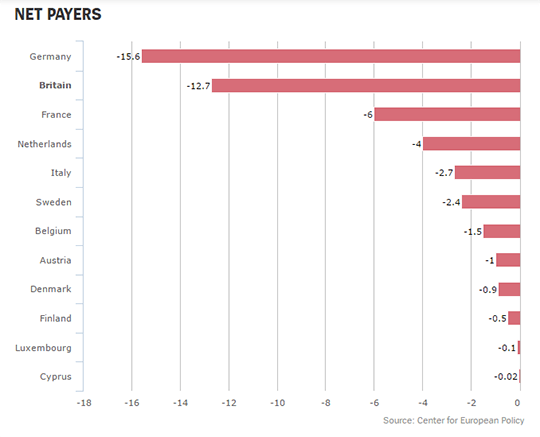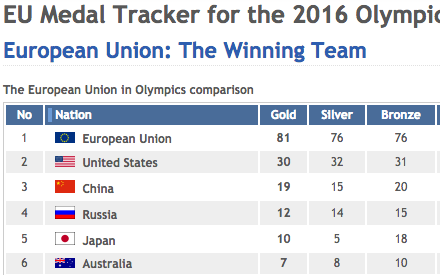I had expected a narrow Remain victory in yesterday’s referendum, but had I been eligible to vote, I’d have voted to Leave. The initial reports I saw certainly made it seem as if Remain had squeaked out a narrow victory, but I was delighted to see my hometown voting convincingly to Leave at over 65%. The revolt of Labour voters probably was the deciding factor in the final result … the Tories had been having trouble for years trying to keep their EU skeptic wing quiet for fear they’d decamp to UKIP, but Labour seemed to have their supporters well in hand. Yet Middlesbrough and many other Labour ridings in the North East were the ones who came out most strongly for Brexit.
David Cameron has announced that he’ll be resigning (as is proper, under the circumstances), so it might be former London mayor Boris Johnson who ends up leading the negotiations with the EU. Jeremy Corbyn hasn’t indicated whether he will also resign over the result, but it would be difficult for him to continue to lead Labour after Labour’s voters came down for the Leave side against their own party’s recommendations. At Samizdata, Brian Micklethwait shared some thoughts:
Re the Jo Cox murder. Many Remainers used this horror to imply that voting Leave was like voting in favour of MPs being murdered. (The Remainers who refrained from using this argument were not so audible.) I surmise that (a) some potential Leavers were persuaded, (b) some potential Leavers were angered and caused to vote Leave having only previously been thinking about it, and (c) quite a few continued to move towards Leave for reasons unrelated to the Jo Cox murder, but in silence. When the Cox murder happened, there was a shift towards Leave taking place. I surmise that this continued to flow, but underground, so to speak. Minds continued to move, but people stopped telling the pollsters. But, they’ve told them now.
[…]
Next, I refer honorable readers to these graphs (which I also wrote about in this posting here). These graphs say: (1) that when the government takes charge of something the immediate effects are often quite good, but in the long run less good, and then bad, and then very bad; and (2) that a piece of market liberalisation has the opposite effect, disruptive and unsettling at first, but then better, and in the long run unimaginably better. This explains why people so often vote for the government arrangement, against their long-term interests. Voters often have a short-term problem and are begging for a short-term fix. But these “Alpha Graphs” also explain something else, which is that when voters think that they are choosing between (1) bad now and bad in the future, or (2) bad now and better in the future, they are capable of voting in their long-term interest because long-term interest is all that there is on offer. Once governmentalism, so to speak, gets towards the far end of its graph and things are getting worse, really quite fast, and will go on getting worse no matter what, the decision changes radically. The only question is: Will the bad news ever stop? All of this now seems relevant to the Referendum debate. “Europe” was, for many, bad and getting worse. Brexit will also be bad, but eventually, better. If you think those two things, Brexit wins. And Brexit did win, with the people in a terminally bad way voting for it most heavily, and the people, like these people, who are now getting by or better voting for Remain, because they have something or a lot to lose.
It was assumed by Remainers that every time another London and/or Global Grandee came out for Remain, that helped the Remain cause. But for many, the unhappiness of such persons about the idea of Leave was a Leave feature rather than a Leave bug.
Speaking of London grandees, Eddie Izzard, dressed like a loon on Question Time, did not, I surmise, help the Remain cause. I mean, he really didn’t help. Imagine (as lucky old libertarian me living comfortably in London only can imagine) being staunch Labour but long-term unemployed, in Wigan or some such place. And you see on your TV some London Labour-Luvvie comedian, cross-dressed like a cross between Margaret Thatcher, Victoria Wood and Benny Hill, arguing for Remain. You’d vote Leave just to shove a stick up this thoughtless, frivolous, openly-contemptuous-of-everything-you-believe-in idiot’s arse, no matter how much more unemployed it might make you. (See above about not having anything to lose. If you have nothing left to lose, or if you merely feel this, punitive voting becomes one of your few remaining pleasures. (More Izzard related ruminations by me here.))
Tim Worstall on the economic implications of Brexit now that it’s a reality:
As to the longer term economic impact there’s all sorts of dire predictions of imminent recession. And this really just doesn’t ring true. The last time sterling fell like this, in 1993, it set off Britain’s longest ever peacetime economic boom. A lower exchange rate is generally taken to be stimulatory to an economy. Sure, there’s something called the J-Curve which means that it might not be immediately so (the idea being that it takes time for people to change their trade habits, meaning that higher import prices and lower export ones might take 18 months to work through into the real economy) but it really is the standard economic position that a decline in the exchange rate boosts the domestic economy. That’s why the IMF always recommends it for economies in trouble.
That is, the very thing that people are worrying about, a Brexit induced recession, is dealt with by the very thing that people are worrying about, a decline in the sterling exchange rate. These markets things do in fact work.
As to what happens in the near future in proper economic terms the answer is, well, nothing. Since the last revision of the European Treaty there is a procedure laid out for how a country leaves the EU. And it is that everything remains exactly as it was yesterday for the two years it takes to negotiate what will happen next. The only thing that will be influencing things is uncertainty about how those negotiations will pan out. That uncertainty being something which, again, is rather well dealt with by this current fall in sterling. Make investing in British assets cheap enough and people will continue to do it.
And to that long term. I think the long term effects are going to be, as long as we follow sensible economic policies post-Brexit, beneficial to the UK economy. Partly on the Patrick Minford grounds, that leaving the EU allows us to take that one sensible trade stance, unilateral free trade, which being in the EU prevents us from taking. But more than that I am absolutely convinced that the generally slow growth of the advanced economies is nothing to do with Larry Summers’ secular stagnation. Nothing to do with inadequate demand, with slow technological growth, not Robert Gordon’s analysis. Rather, it is the accretion of regulation of the economy that is responsible. And leaving the EU means that Britain can free itself from much to all of that – if it so desires of course.
This does not mean getting rid of the welfare state, doesn’t mean some laissez faire capitalism red in tooth and claw. Just very much less paper pushing and the asking of bureaucratic permission to do things. Just rather more of that Uber idea, move fast and break things. If you prefer, economic growth depends not so much on people innovating but there being space not controlled by the previous rules for people to innovate into. And recreating that space is something that Brexit will allow us to do.





